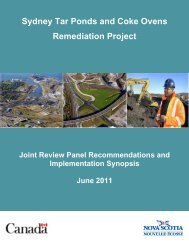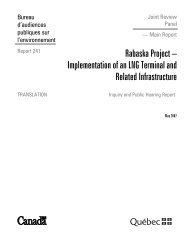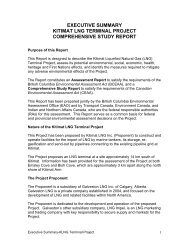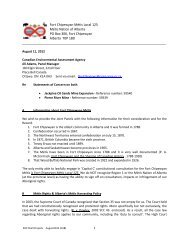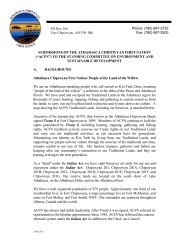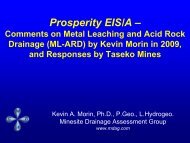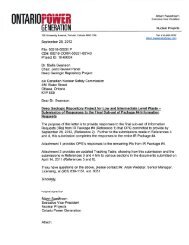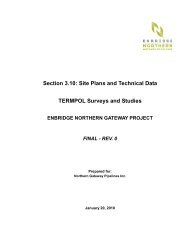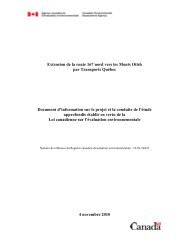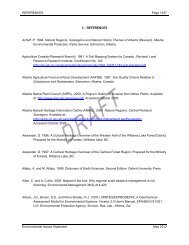From: on behalf of Panel Registry Subject: FW: TNG registration of ...
From: on behalf of Panel Registry Subject: FW: TNG registration of ...
From: on behalf of Panel Registry Subject: FW: TNG registration of ...
Create successful ePaper yourself
Turn your PDF publications into a flip-book with our unique Google optimized e-Paper software.
understand the implicati<strong>on</strong>s <strong>of</strong> climate change and it also served to check the validity <strong>of</strong><br />
scientific<br />
c<strong>on</strong>clusi<strong>on</strong>s.<br />
Table 1: List <strong>of</strong> Study Parameters and Tools<br />
Assessment Parameters Tools<br />
1. Historical trend analysis <strong>of</strong> climate<br />
changes and variability<br />
Key informants interviews, data<br />
2. Future climate change and<br />
variability<br />
projecti<strong>on</strong><br />
Computer modeling<br />
3. Climate Impact analysis Pr<strong>of</strong>essi<strong>on</strong>al estimati<strong>on</strong>s, Literature review, BEC<br />
modeling<br />
4. Vulnerability Assessment Literature review, Key informant interviews<br />
5. Adaptati<strong>on</strong> strategies Key informant interviews, Literature review<br />
Sec<strong>on</strong>dary informati<strong>on</strong> in the form <strong>of</strong> historical climate data was also used to develop a<br />
climate baseline for the study. Literature surveys and pr<strong>of</strong>essi<strong>on</strong>al opini<strong>on</strong>s were used to<br />
inform estimates regarding projected biophysical impacts, climate vulnerabilities and<br />
adaptati<strong>on</strong> strategies. And computer modeling was used to develop climate projecti<strong>on</strong>s.<br />
Except for the climate modeling, much <strong>of</strong> the analysis in the report was qualitative. This<br />
was due to the short time frame and modest budget <strong>of</strong> the project as well as the rather<br />
limited state <strong>of</strong> climate impact modeling at the regi<strong>on</strong>al and local level.<br />
Climate Projecti<strong>on</strong>s<br />
Climatic data have been produced by the computer program ClimateBC 5, which <strong>of</strong>fers high<br />
resoluti<strong>on</strong> spatial climate data for current and future climate change scenarios. This is<br />
particularly useful for remote regi<strong>on</strong>s like the XGCA. Recent climatic variables have been<br />
averaged spatially (i.e. with a resoluti<strong>on</strong> <strong>of</strong> roughly 6 km 2) throughout the XGCA and<br />
temporally for the periods 1961 – 1990 (which we c<strong>on</strong>sider as representative <strong>of</strong> present<br />
climate). Future climate projecti<strong>on</strong>s are based <strong>on</strong> the Canadian Global Circulati<strong>on</strong> Model<br />
versi<strong>on</strong> 2 (CGCM2) for two future emissi<strong>on</strong> scenarios as defined by the Intergovernmental<br />
<strong>Panel</strong> <strong>on</strong> Climate Change (IPCC). The A1F1 emissi<strong>on</strong> (or “worst case”) scenario describes a<br />
future world <strong>of</strong> very rapid ec<strong>on</strong>omic growth, global populati<strong>on</strong> that peaks in the mid‐<br />
century and declines thereafter, and rapid introducti<strong>on</strong> <strong>of</strong> new and more efficient<br />
technologies with an emphasis <strong>on</strong> fossil fuel energy sources. The B2 emissi<strong>on</strong> (or “best<br />
case”) scenario describes a world in which the emphasis is <strong>on</strong> local soluti<strong>on</strong>s to ec<strong>on</strong>omic,<br />
social, and envir<strong>on</strong>mental sustainability. Both emissi<strong>on</strong> scenarios are projected for the<br />
2020’s (i.e., 2020 – 2029) and 2050’s (i.e., 2050 – 2059). In additi<strong>on</strong>, both emissi<strong>on</strong><br />
scenarios depict the same general trend; however, the intensity or scale <strong>of</strong> the trend is<br />
different.<br />
Wildlife & Wild Horse Impacts<br />
5 See: http://www.genetics.forestry.ubc.ca/cfcg/climate‐models.html<br />
5



